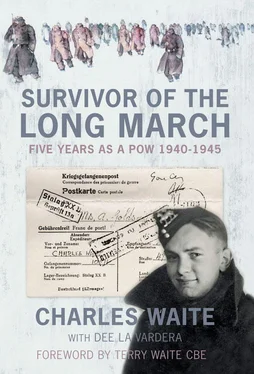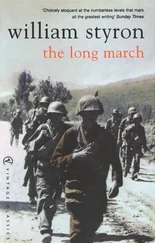We would be walking along as usual when one of us would look round and say, ‘Where’s Jimmy?’ He was always slipping off somewhere unnoticed. Nowhere to be seen. Then he would re-appear with something he had found.
One day, Jimmy was checking out houses to see if there was anybody about. Not that people being at home put him off going in. Sometimes we arrived in a village not long after the civilians had fled after another bombing raid or in fear of Russian troops arriving. Some men slept in the abandoned houses but my pals and I never did. Jimmy went into one cottage which was empty and looked around the kitchen and found some jugged geese legs, preserved in an earthenware jar, on a shelf in a cupboard. He hid it under his coat and brought it back. Sounds strange but they were delicious heated up. I would have eaten them cold. I wasn’t fussy. Pity we had to ditch the jar, as it might have come in handy, but it was too heavy to carry.
Rations very bad. Everybody hungry and weak.
Our planes are bombing every day and night.
Another time, what did Jimmy bring back? Before we had time to miss him he appeared carrying a milk churn. He had been into a cottage to look around and had found two loaves of bread. He grabbed them and when he got outside put them in a churn to hide them from the guards or anybody else who would try to take them away. We had a lot of bread that night. Bread was always an important part of our diet and if we weren’t getting our ration from the Germans because their supply had dried up, it was every man for himself.
If the Germans managed to get fresh bread it was of course as much for them as for us. What they did was to send one of the carts ahead with a couple of armed guards to order loaves from the baker in the next town 8 or 10km away– if there was one still in business. The baker didn’t have any choice. The officer would work out how many loaves were needed for the hundred or so of us plus the guards. They had a loaf between two of them while we shared a loaf with eight or more. When we arrived at the village the bread would be waiting and we would collect it and then be on our way. It was such a treat when you lined up later in the day and got your slice of bread from a loaf.
However, on more than one occasion, the price of that bread was half a brick thrown at your head.
As we marched through villages and towns, civilians would come out of their houses and throw stones and bricks at us. Because we were British (or French, Belgian or American, they didn’t know) and prisoners of war. Two days before this, our planes had been over and smashed their homes, killed their people so it wasn’t surprising how they felt; they were bound to be resentful and want to get their own back. This meant that the German guards escorting us were also getting struck by these missiles, so they had to do something to stop it – for their own sakes if not for ours.
Half a dozen guards would go ahead of the marching column, machine guns at the ready to make sure there was nobody outside ready to throw stones or bricks at us. The last thing they wanted was casualties because that would be a burden on us all. The cart was full most of the time with injured and ill men. It slowed us down. We had to stop to tend to them until we reached the next camp or wherever it was we could leave them to be looked after.
A bit of bread kept body and soul together. Kept us moving. On and on. Kept those legs moving. The things we did for a bite to eat. I stole a piece of bread from somebody. One night we were sleeping in an old barn, all huddled up together and I was the one on the end of the row. We used to take it in turns as that was the coldest spot. I saw this chap next to me tuck a chunk of bread under his coat which he was using as a pillow. When he was facing away from me, I reached out and slipped my fingers under the coat and took it out. That’s how bad it was. Stealing from a fellow prisoner. No good trying to share it with my pals as I would have had to move and then draw attention to myself. This chap would soon realise what was going on. I wolfed the bread down but I didn’t enjoy eating it.
Each day one of us took charge of the water can, sometimes our only supply during the day if we were able to get it filled. On one of his house visits, Jimmy had found a miner’s lamp with a handle and a lid and he adapted it to use for carrying water. I think it was later on our journey, when the weather was better and the roads were dry, probably the middle of March when we were going through another small village. There were eight cottages ranged in pairs with a gap between. Laurie, Sid and Heb were up ahead; Jimmy and I loitering behind. I was looking around when something caught my eye. I pulled at Jimmy’s sleeve.
‘Hang on, Jimmy,’ I said, ‘I think there’s a pump.’ I was in charge of the water can that day. I thought I had seen one round the back of a cottage and would take the opportunity to try and fill it up.
‘OK, Chas, you catch us up.’ He left me and carried on walking.
I walked across to the cottages which all looked empty and rundown, gardens untended and rubbish all around as though families have left in a hurry. I went down between two cottages to the back into a cobbled yard where I saw this pump. So I grabbed this rusty old handle and I was trying it first to see if it worked, pulling it up and down, up and down. It was squeaking, making an awful racket. ‘Come on, come on. Water. Water. Quick,’ I said out loud. That’s all I needed, somebody to hear me and catch me in the act.
All of a sudden the back door of the cottage opened and a man called out ‘ Guten Tag, ’ – good day.
So I said, ‘ Guten Tag. ’ Oh God, he’d caught me. What was I going to do?
Then he called out ‘ Wohin gehst du?’ – where are you going?
I didn’t know what to say so I replied, ‘ Ich weiss nicht .’ – I don’t know.
Then I saw that he was coming out of the house and down the path towards me. I decided to stop pumping and walked towards him and met him half way.
‘ Einen Augenblick ,’ – wait a minute, he said, signalling with his hands for me to stay there. He turned and went back indoors and I waited a couple of minutes before he came out again carrying a small packet wrapped up in newspaper. He held it out to me, ‘ Für Sie’ – for you, and pushed it towards me and said, ‘ Viel Glück ,’ – good luck, ‘ Sehr viel Glück,’ – lots of luck.
I opened it carefully, not sure what I was going to find and took a quick look. I could see some homemade biscuits and half a dozen hand-rolled cigarettes. I thanked him, ‘ Vielen Dank,’ adding ‘Sehr gütig,’ – very kind.
As I walked away, I looked back over my shoulder and saw this poor old man, still standing there outside this run-down old cottage. I felt bad. He hadn’t got much himself. He probably thought I was German because I managed a few words in his language. There was a German unit called the Arbeitsteam – working party, in the area. They also wore a khaki uniform when on duty, similar to ours. I reckoned that was what he thought I was. He was giving me something to help his side. I answered his questions truthfully. I didn’t know where we were going and I got away with it. But I felt sorry because as he turned to go back inside, I glimpsed an old lady, his wife, I imagined, through the half-open door, lying inside on a little camp bed.
Everybody else had gone, had left the place but she was too ill or too old to leave and so they stayed. Poor man, he thought he was helping a German. But then again, he might not have minded. Perhaps he just saw someone in a similar position to himself and did what he thought was right. I was worried that the Russians were not far behind and fearful of what would happen to them when they arrived. He and his wife had done nothing wrong. They were victims too, just like the rest of us.
Читать дальше




![Джеффри Арчер - The Short, the Long and the Tall [С иллюстрациями]](/books/388600/dzheffri-archer-the-short-the-long-and-the-tall-s-thumb.webp)







